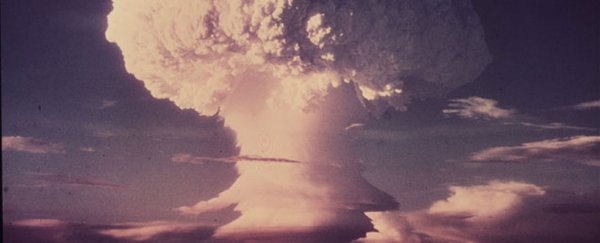North Korea's announcement that it successfully detonated a hydrogen bomb this week has provoked outrage virtually everywhere else in the world, but there's also considerable doubt as to whether the claims are legitimate.
The first sign that something of this nature had occurred came from US and South Korean seismologists, who detected a magnitude–5.1 tremor at about 9PM ET on Tuesday. The quake's epicentre was located 49 kilometres (30 miles) from Punggye-ri in North Korea's north-east – the site of former nuclear tests.
"We suspect a man-made earthquake, and are analysing the scale and epicentre of the quake with the geoscience and mineral resource institute of South Korea," a Korea Meteorological Administration (KMA) official told Reuters.
Soon after, North Korean state television broadcast footage of leader Kim Jong-un with a handwritten note reading "Let the world look up to the strong, self-reliant nuclear-armed state".
The demonstration comes one month after North Korea claimed to be in possession of hydrogen bomb technology, although at the time, the announcements were treated with considerable skepticism.
"I think it's unlikely that they have an H-bomb at the moment, but I don't expect them to keep testing basic devices indefinitely, either," Jeffrey Lewis of the California-based Middlebury Institute of International Studies at Monterey told Reuters in December.
Skepticism also surrounds the new announcements of the successful detonation, as hydrogen bombs are much more powerful than atomic bombs, due to their coupling of nuclear fission with nuclear fusion, whereas atomic bombs rely solely on nuclear fission. This difference that could well inform the psychological aspect of the hydrogen bomb claims, as they would constitute a much more threatening weapon in North Korea's arsenal.
"The bang they should have gotten [with a hydrogen bomb] would have been 10 times greater than what they're claiming," Bruce Bennett, an analyst with the Rand Corporation, told the BBC. "So Kim Jong-un is either lying, saying they did a hydrogen test when they didn't, they just used a little bit more efficient fission weapon – or the hydrogen part of the test really didn't work very well or the fission part didn't work very well."
The US has also disputed the claims, but acknowledged it will be some time before scientists or intelligence agents are able to determine what really happened.
"We are aware of seismic activity on the Korean Peninsula in the vicinity of a known North Korean nuclear test site and have seen Pyongyang's claims of a nuclear test," Ned Price, a spokesperson from the White House National Security Counsel (NSC), told the press. "While we cannot confirm these claims at this time, we condemn any violation of UN Security Council resolutions and again call on North Korea to abide by its international obligations and commitments."
For information on the radionuclide network that makes it possible to detect nuclear explosions around the world, check out this video:

